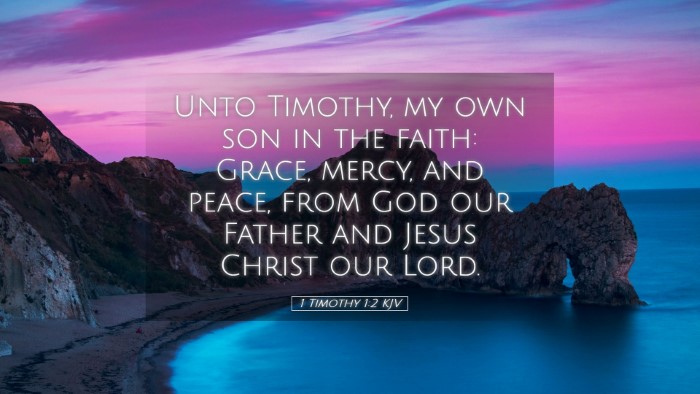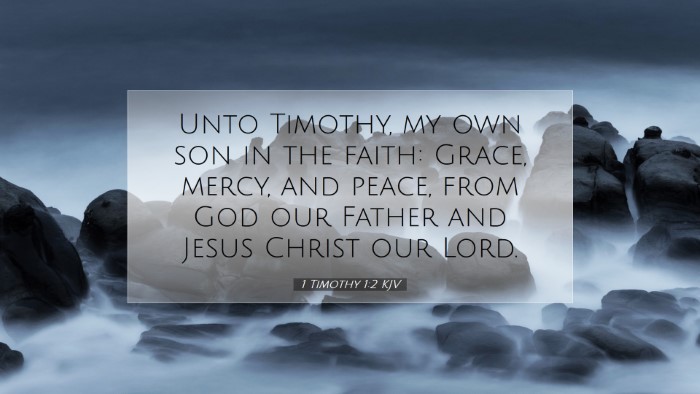Old Testament
Genesis Exodus Leviticus Numbers Deuteronomy Joshua Judges Ruth 1 Samuel 2 Samuel 1 Kings 2 Kings 1 Chronicles 2 Chronicles Ezra Nehemiah Esther Job Psalms Proverbs Ecclesiastes Song of Solomon Isaiah Jeremiah Lamentations Ezekiel Daniel Hosea Joel Amos Obadiah Jonah Micah Nahum Habakkuk Zephaniah Haggai Zechariah Malachi1 Timothy 1:2
1 Timothy 1:2 KJV
Unto Timothy, my own son in the faith: Grace, mercy, and peace, from God our Father and Jesus Christ our Lord.
1 Timothy 1:2 Bible Commentary
Introduction to 1 Timothy 1:2
1 Timothy 1:2 states: "To Timothy, my own son in the faith: Grace, mercy, and peace, from God our Father and Jesus Christ our Lord." This simple yet profound greeting encapsulates not only the relational dynamic between the Apostle Paul and Timothy but also the theological depth that underpins their relationship and ministry. In this commentary, we explore the rich implications of this verse through the insights of notable public domain commentators such as Matthew Henry, Albert Barnes, and Adam Clarke.
Exposition of Key Themes
1. Relationship: Sonship in Faith
Matthew Henry highlights the paternal aspect of Paul's address, referring to Timothy as "my own son in the faith." This phrase emphasizes not merely an affection but a profound spiritual lineage. Paul, as a spiritual father, played a crucial role in Timothy's formation as a Christian leader. This term of endearment is significant in Christian ministry, illustrating the importance of mentoring and spiritual parenting.
Similarly, Albert Barnes notes that this expression indicates a close bond formed through shared experiences and the mutual pursuit of faith. Timothy’s youth did not detract from his authority; rather, his relationship with Paul provided him with the necessary confidence and credibility to confront the challenges of leadership within the early Church.
2. Divine Blessings: Grace, Mercy, and Peace
The apostolic greeting continues with a trinitarian blessing: "Grace, mercy, and peace." These three words, according to Adam Clarke, embody the Christian's experience of salvation and ongoing sanctification. Grace represents unmerited favor, the foundation upon which one enters into a relationship with God. Mercy speaks to God's compassion and forgiveness, essential for any believer's spiritual journey. Peace reflects the internal state of harmony with God that manifests through righteous living and faith.
Grace
Henry elaborates further on grace, stating that it is the root of all Christian blessing and power. For Timothy to lead effectively, he must operate in the grace of God, which empowers him to fulfill his calling amid adversities.
Mercy
Barnes emphasizes that mercy denotes a specific request for God's kindness towards Timothy, especially in light of the trials he would face. This seeking of mercy reinforces the notion that leadership in the church is not merely a position of authority but one of service and neediness before God.
Peace
Clarke connects peace with the concept of harmony, asserting that it is a state gifted by God that transcends worldly understanding. In a tumultuous ministry context, peace serves as both a personal refuge for Timothy and a communal blessing to the Ephesian congregation.
Contextual Implications
Understanding the context of this epistolary greeting is crucial. Matthew Henry posits that Timothy was confronting significant challenges in the Ephesian church, including false teachings and leadership disputes. Thus, Paul's words serve not only as encouragement but also as an empowerment rooted in their relationship and the theological truths at play.
Challenges in Ephesus
Albert Barnes notes that the Ephesian church faced external pressuresand internal discord, which made Timothy's role as a pastor even more critical. The advice and blessings from Paul were an essential source of strength for Timothy, underscoring that true effectiveness in ministry often stems from a strong connection to God’s grace, mercy, and peace.
Theological Reflections
In verse 2, there lie key theological reflections that are vital for contemporary believers and church leaders.
1. The Nature of Apostolic Authority
The designation of Timothy as "my own son" not only strengthens personal ties but also affirms apostolic authority. Matthew Henry asserts that spiritual authority must be grounded in personal investment. Leaders in the church are called not only to teach but to nurture their followers in the faith.
2. The Importance of Community
This greeting serves as a reminder of the communal nature of the Christian experience. Adam Clarke suggests that the blessings offered—grace, mercy, peace—are not only individual experiences but collective ones that the church must embody. The Church is to be a community that reflects the very essence of these blessings in its relationships.
3. The Assurance of God’s Favor
Paul’s declaration of grace, mercy, and peace affirms that these are not just abstract concepts but assurances of God’s presence and aid. Albert Barnes reiterates that church leaders today must remember these foundational blessings as they navigate their calling, reinforcing that divine support is always accessible through faith.
Conclusion
1 Timothy 1:2 is a powerful verse that encapsulates the deep and dynamic relationship between Paul and Timothy while simultaneously articulating key theological themes relevant to Christian life and ministry. The insights gathered from Matthew Henry, Albert Barnes, and Adam Clarke provide a multifaceted understanding that serves to enrich the knowledge of pastors, students, theologians, and Bible scholars alike.
Ultimately, this verse encourages those in leadership to foster nurturing relationships, seek divine grace, mercy, peace, and cultivate a communal understanding of the Christian faith to effectively fulfill their calling.


